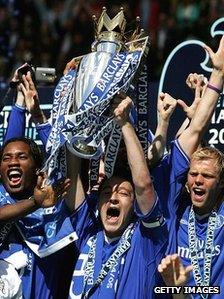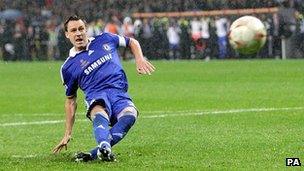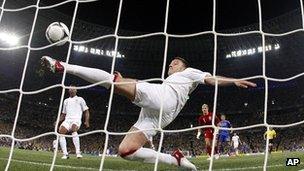John Terry: Chelsea captain who divides opinion
- Published

John Terry has captained Chelsea to three Premier League titles since 2005
For more than a decade John Terry has captained Chelsea, leading the club during its most successful era.
Famed for his on-pitch leadership, Chelsea supporters regard Terry, who came through their youth teams, as a great captain.
He has lifted more trophies than all his predecessors as Chelsea skipper put together. And a banner displayed at Stamford Bridge at every home game has a picture of Terry's face and the words "JT CAPTAIN, LEADER, LEGEND".
But the defender, who has been cleared of racially abusing QPR's Anton Ferdinand, has also been described as one of the most unpopular players in the country among rival fans.
Part of this is due to a number of off-field controversies, particularly an alleged affair with a team-mate's ex-girlfriend which cost him the England captaincy in 2010.
Born in Barking, east London, Terry, 31, made his name as a teenager, making his first-team debut as a 17-year-old.
Three years later he captained Chelsea for the first time.
'Fantastic captain'
France World Cup-winner Marcel Desailly was at Chelsea from 1998 to 2004 and gave an emerging Terry the benefit of his experience.
Desailly said: "There will be plenty of foreigners who will come and go, but he [Terry] will stay there and make the new players understand the spirit of the club and the story of the where it has come from."
The France defender's prediction proved correct.
In his first full season as Chelsea skipper in 2004-05, Terry led the club to the Premier League title for the first time.
The defender started 36 of the 38 Premier League matches that season and his form resulted in him being <link> <caption> crowned PFA Player of the Year.</caption> <url href="http://news.bbc.co.uk/sport1/hi/football/eng_prem/4478329.stm" platform="highweb"/> </link> He was a key part of Jose Mourinho's Chelsea side that won consecutive league titles.
Current Real Madrid boss Mourinho said: "When you say that John Terry was a fantastic captain for me you are right."
Terry was first called up to the England squad by Sven-Goran Eriksson in June 2003. In the 2006 World Cup, England went out at the quarter-final stage but Terry was the only English player to be named in the tournament's all-star squad.
These performances led to him being named national captain in August 2006 under Steve McClaren.
Refused injunction
But before and after he was given that honour, Terry seemed a magnet for bad publicity. In the summer of 2002, when some had thought the 21-year-old Terry might be in England's World Cup squad, he instead found himself in court accused of attacking a nightclub doorman with a bottle. <link> <caption> The jury found him not guilty.</caption> <url href="http://news.bbc.co.uk/1/hi/england/2205505.stm" platform="highweb"/> </link>
In 2008 he was fined £60 for parking his Bentley in a disabled bay and he has also been banned from driving for speeding. And during the speeding charge hearing in June 2011 <link> <caption>it emerged police found a tracking device attached to his car</caption> <url href="http://www.bbc.co.uk/news/uk-england-surrey-13734330http://" platform="highweb"/> </link> - with his lawyer suggesting it may have helped paparazzi target the footballer.

Terry missed a key penalty when Chelsea lost the Champions League final shoot-out in 2008
Terry's England captaincy lasted two years before he was <link> <caption>stripped of the honour</caption> <url href="http://news.bbc.co.uk/sport1/hi/football/8495604.stm" platform="highweb"/> </link> in February 2010 following the allegations he had an affair with the ex-partner of Wayne Bridge, his former Chelsea and England team-mate.
Terry unsuccessfully <link> <caption>attempted to use an injunction</caption> <url href="http://news.bbc.co.uk/1/hi/uk/8488232.stmhttp://" platform="highweb"/> </link> to prevent the media from reporting the allegations and when Chelsea next played Bridge's Manchester City side, the left back made the high-profile gesture of refusing to shake Terry's hand.
But within months of the controversy Terry had led Chelsea to the league and cup double and he remained a hero to most of the club's fans - and often publicly acknowledged their support.
And while the negative headlines stacked up, Terry was quietly supporting charities, <link> <caption> campaigning against knife crime</caption> <url href="http://news.bbc.co.uk/1/hi/uk/7777545.stmhttp://" platform="highweb"/> </link> and making a donation that <link> <caption>helped keep the football team he played for as a boy in business</caption> <url href="http://www.bbc.co.uk/news/uk-england-london-13156538" platform="highweb"/> </link> .
Re-appointed captain
He kept his England place after the 2010 World Cup despite being criticised for his defending when England were knocked out by Germany and for speaking negatively the team's performance in a news conference during the tournament - a move which some observers interpreted as a response to being stripped of the leadership of the squad.
And to the surprise of many, he was re-appointed England captain in March 2011 after Rio Ferdinand - the man chosen as his replacement as skipper - suffered a long-term injury. But, again, Terry's tenure was ended by controversy.
Terry was alleged to have made racist comments towards Queens Park Rangers defender Anton Ferdinand, Rio Ferdinand's brother, in a league match on 23 October 2011. He denied the charge - and would ultimately be found not guilty at Westminster Magistrates' Court.

At Euro 2102, Terry's reputation on the field was restored with a series of strong performances
But the racism charge saw the Football Association relieve Terry of his captaincy duties for a second time in February. <link> <caption>Fabio Capello, then England manager, resigned shortly afterwards</caption> <url href="http://www.bbc.co.uk/sport/0/football/16941457" platform="highweb"/> </link> having criticised the decision.
Terry found himself at the centre of another storm but still helped lead Chelsea to the FA Cup and Champions League - although he was suspended for the European final after a red card against Barcelona.
Despite the success, critics were still questioning whether his football ability was on the decline.
Then came Euro 2012 and, despite England's exit to Italy in the quarter-final, Terry's reputation on the field was restored with a series of strong performances.
England coach Hodgson said after the tournament: "He has been a top-class professional and very good off the field as well."
Team-mates and former managers and coaches - including Jose Mourinho and Ray Wilkins - also praised Terry in statements read to the racism trial.
Wilkins, himself a former Chelsea and England captain, who in spells as a coach and assistant manager at the west London club has known Terry since he was 16, said the player had faced some "unmerciful criticism" and he had never seen him react.
"That's testimony to the guy," Mr Wilkins told the court.
And the not guilty verdict would appear to leave Terry free to carry on the career that has seen him win a host of medals, England caps and admiration for his on-field performances.